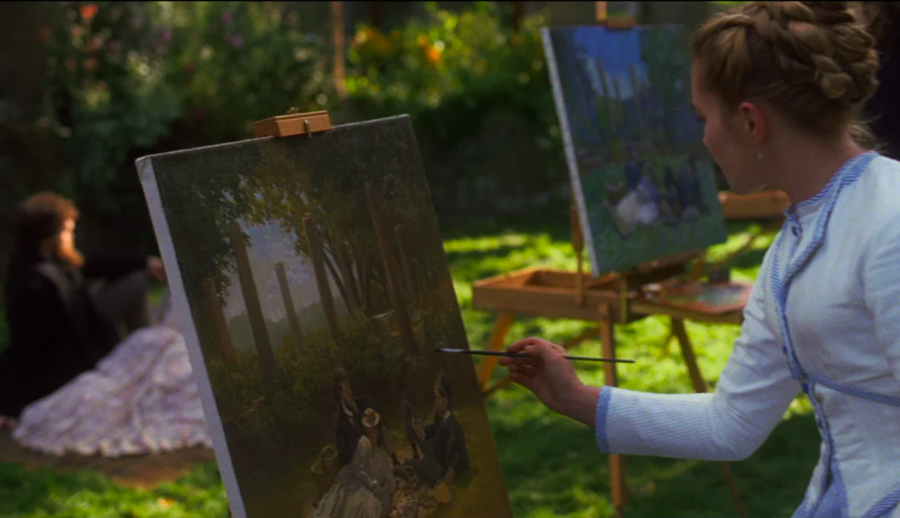Little Women: A Review
Amy, portrayed by Florence Pugh, paints during one of the scenes of Little Women. Blending a sometimes-endearing childishness with stark maturity and wit, Amy is just one of the many characters from Little Women which captivates audiences with her authenticity. (PC: Vimeo.com)
2019 is the year for movie remakes—Aladdin, Dumbo, The Lion King, and Pet Semetary all come to mind. It seems only fair Louisa May Alcott’s classic novel, which had previously been adapted for the big screen on six other occasions, had its turn at being remade.
After phenomenal success in both the box office and awards season, one thing becomes clear: Little Women is nothing short of a generation-spanning, Oscar-winning, record-breaking triumph.
The success of 2019’s take on Little Women was largely due to the writing and directing work of Greta Gerwig. Though Gerwig has been active in the film industry since the early 2000s, it was her work as the writer and director of the 2017 film Lady Bird that solidified her reputation as a director. Gerwig’s success with Lady Bird—which took home five Oscar nominations and two Golden Globe wins—set the bar high for her next work: Little Women.
And she certainly did not disappoint. Throughout the approximately two hour runtime of the movie, Gerwig manages to build a story both that keeps in line with the traditional plot of the novel and stays fresh for modern viewers.
This freshness originates from Gerwig’s writing—equal parts entertaining and moving—as well as the all-star cast. The four March sisters—Jo, Meg, Amy, and Beth—are played by Saorise Ronan, Emma Watson, Florence Pugh, and Eliza Scanlen respectively. They are all big figures in the film industry already, and, in case those acclaimed actresses aren’t enough for you, Timothée Chalamet—known best for 2017’s Call Me By Your Name—also stars in the movie as Teddy “Laurie” Lawrence. So do Laura Dern, Bob Odenkirk, and James Norton—names that all carry notoriety with them.
Both the book and film adaptation follow the same plot, and, despite the antiquated time period, the story is still one that every viewer can find aspects to relate to. This is encouraged by the vibrant and unique personalities of each of the March sisters. Meg is caring and responsible, the ‘mom-friend’ of the sisters. Jo is strong-willed, intelligent, and filled with creative talents. Amy is witty with just the right flair for overdramatics, made all the more loveable with one-liners like “I have lovely small feet—the best in the family.” And Beth, the youngest of the sisters, is the embodiment of kindness without it ever feeling forced. The differences between these personalities create character dynamics that many in the audience can connect with on some level.
Little Women tells the story of the four sisters—primarily from the perspective of one of the middle girls, Jo—as they grow up and expand out of their hometown of Concord, Massachusetts. And that’s about the extent of the story. There are no quests or magical powers or even definable heroes and villains—simply four teenage girls trying to figure out their places in the world.
Gerwig’s method of telling the story—which involves, not a linear progression of time, but rather jump-cuts between the past and the present—is also particularly effective. Not only are the viewers encouraged to pay attention as the timeframe of the film shifts back and forth, but they are also presented with a key opportunity: the ability to see the characters grow up. We see them in both the present and past, watching them mature into the people they are meant to become. Through the blend of past and present Gerwig creates through jump-cuts, they become the people we knew they always would.
These moments of growth are punctuated by social commentary. The audience sees how each character does or doesn’t adhere to the social expectations of the late 19th-century. Jo, for example, rejects the romantic advances of her childhood best friend, Laurie, to pursue her writing career, while Meg, on the other hand, marries the man she loves. The emphasis on the need to conform is appropriately obsolescent and achingly relatable to modern-day viewers.
Its relatability is the way Little Women succeeds most. Not in an affected, over-satirized way, but in a way that is genuine and sincere. Through the actors’ talents and Gerwig’s direction, the 19th-century story emerges into the modern age as one easy to appreciate and connect with. Because the key themes of Little Women—searching for independence and freedom in a world that allows very little of it, growing up, losing loved ones, and simply wanting to be loved—extend far beyond the historical timeframe of the story. And that, perhaps, above all else is Little Women’s greatest achievement.

Daniel White is a senior and Editor-in-Chief, returning to The Tower for his third year. Aside from spending copious amounts of time getting very stressed...







